formerly eScholarship Editions


|
|
|
|
Your request for similar items found 20 book(s). | Modify Search | Displaying 1 - 20 of 20 book(s) | |
| 1. | 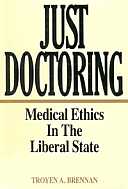 | Title: Just doctoring: medical ethics in the liberal state Author: Brennan, Troyen A Published: University of California Press, 1991 Subjects: Philosophy | Ethics | Medicine Publisher's Description: Just Doctoring draws the doctor-patient relationship out of the consulting room and into the middle of the legal and political arenas where it more and more frequently appears. Traditionally, medical ethics has focused on the isolated relationship of physician to patient in a setting that has left the physician virtually untouched by market constraints or government regulation. Arguing that changes in health care institutions and legal attention to patient rights have made conventional approaches obsolete, Troyen Brennan points the way to a new, more aware and engaged medical ethics.The medical profession is no longer isolated, even theoretically, from the liberal, market-dominated state. Old ideas of physician beneficence and altruism must make way for a justice-based medical ethics, assuming a relationship between equals more compatible with liberal political philosophy. Brennan offers clinical examples of many of today's most challenging medical problems - from informed consent to care rationing and the repercussions of the HIV epidemic - and gives his recommendation for a new ethical perspective. This lively and controversial plea for a rethinking of medical ethics goes right to the heart of medical care at the end of the twentieth century. [brief] Similar Items |
| 2. |  | Title: Inventing the feeble mind: a history of mental retardation in the United States Author: Trent, James W Published: University of California Press, 1994 Subjects: History | United States History | Sociology | American Studies | Psychiatry Publisher's Description: James W. Trent uses public documents, private letters, investigative reports, and rare photographs to explore our changing perceptions of mental retardation over the past 150 years. He contends that the economic vulnerability of mentally retarded people (and their families), more than the claims mad . . . [more] Similar Items |
| 3. | 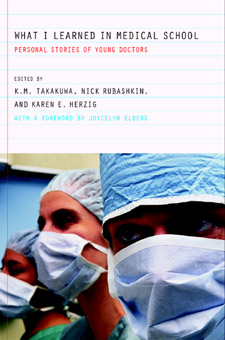 | Title: What I learned in medical school: personal stories of young doctors Author: Takakuwa, Kevin M Published: University of California Press, 2004 Subjects: Medicine | Sociology | Ethnic Studies | Gender Studies | Anthropology | Health Care Publisher's Description: Like many an exclusive club, the medical profession subjects its prospective members to rigorous indoctrination: medical students are overloaded with work, deprived of sleep and normal human contact, drilled and tested and scheduled down to the last minute. Difficult as the regimen may be, for those who don't fit the traditional mold - white, male, middle-to-upper class, and heterosexual - medical school can be that much more harrowing. This riveting book tells the tales of a new generation of medical students - students whose varied backgrounds are far from traditional. Their stories will forever alter the way we see tomorrow's doctors. In these pages, a black teenage mother overcomes seemingly insurmountable odds, an observant Muslim dons the hijab during training, an alcoholic hides her addiction. We hear the stories of an Asian refugee, a Mexican immigrant, a closeted Christian, an oversized woman - these once unlikely students are among those who describe their medical school experiences with uncommon candor, giving a close-up look at the inflexible curriculum, the pervasive competitive culture, and the daunting obstacles that come with being "different" in medical school. Their tales of courage are by turns poignant, amusing, eye-opening - and altogether unforgettable. [brief] Similar Items |
| 4. | 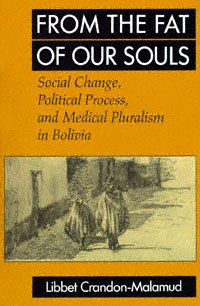 | Title: From the fat of our souls: social change, political process, and medical pluralism in Bolivia Author: Crandon-Malamud, Libbet Published: University of California Press, 1991 Subjects: Anthropology | Latin American Studies | Politics | Medical Anthropology | Medicine Publisher's Description: From the Fat of Our Souls offers a revealing new perspective on medicine, and the reasons for choosing or combining indigenous and cosmopolitan medical systems, in the Andean highlands. Closely observing the dialogue that surrounds medicine and medical care among Indians and Mestizos, Catholics and Protestants, peasants and professionals in the rural town of Kachitu, Libbet Crandon-Malamud finds that medical choice is based not on medical efficacy but on political concerns. Through the primary resource of medicine, people have access to secondary resources, the principal one being social mobility. This investigation of medical pluralism is also a history of class formation and the fluidity of both medical theory and social identity in highland Bolivia, and it is told through the often heartrending, often hilarious stories of the people who live there. [brief] Similar Items |
| 5. | 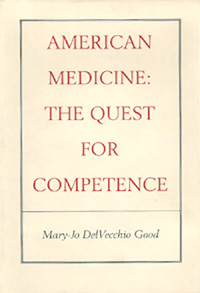 | Title: American medicine: the quest for competence Author: Good, Mary-Jo DelVecchio Published: University of California Press, 1995 Subjects: Medicine | Science | Medical Anthropology | Public Policy Publisher's Description: What does it mean to be a good doctor in America today? How do such challenges as new biotechnologies, the threat of malpractice suits, and proposed health-care reform affect physicians' ability to provide quality care?These and many other crucial questions are examined in this book, the first to fully explore the meaning and politics of competence in modern American medicine. Based on Mary-Jo DelVecchio Good's recent ethnographic studies of three distinct medical communities - physicians in rural California, academics and students involved in Harvard Medical School's innovative "New Pathway" curriculum, and oncologists working on breast cancer treatment - the book demonstrates the centrality of the issue of competence throughout the medical world. Competence, it shows, provides the framework for discussing the power struggles between rural general practitioners and specialists, organizational changes in medical education, and the clinical narratives of high-technology oncologists. In their own words, practitioners, students, and academics describe what competence means to them and reveal their frustration with medical-legal institutions, malpractice, and the limitations of peer review and medical training.Timely and provocative, this study is essential reading for medical professionals, academics, anthropologists, and sociologists, as well as health-care policymakers. [brief] Similar Items |
| 6. | 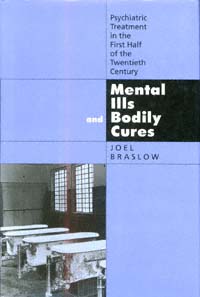 | Title: Mental ills and bodily cures: psychiatric treatment in the first half of the twentieth century Author: Braslow, Joel T 1959- Published: University of California Press, 1997 Subjects: Science | Psychiatry | Medicine | History and Philosophy of Science | Psychology Publisher's Description: Mental Ills and Bodily Cures depicts a time when psychiatric medicine went to lengths we now find extreme and perhaps even brutal ways to heal the mind by treating the body. From a treasure trove of California psychiatric hospital records, including many verbatim transcripts of patient interviews, Joel Braslow masterfully reconstructs the world of mental patients and their doctors in the first half of the twentieth century. Hydrotherapy, sterilization, electroshock, lobotomy, and clitoridectomy - these were among the drastic somatic treatments used in these hospitals.By allowing the would-be healers and those in psychological and physical distress to speak for themselves, Braslow captures the intense and emotional interplay surrounding these therapies. His investigation combines revealing clinical detail with the immediacy of "being there" in the institutional setting while decisions are made, procedures undertaken, and results observed by all those involved. We learn how well-intentioned physicians could rationalize and regard as therapeutic treatments that often had dreadful consequences, and how much the social and cultural world is inscribed within the practice of biological psychiatry. The book will interest historians of medicine, practicing psychiatrists, and everyone who knows or has seen what it's like to be in mental distress. [brief] Similar Items |
| 7. | 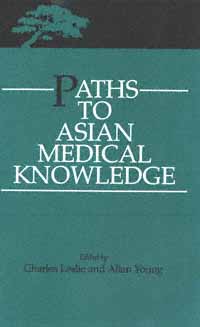 | Title: Paths to Asian medical knowledge Author: Leslie, Charles M 1923- Published: University of California Press, 1992 Subjects: Anthropology | Medical Anthropology | Asian Studies Publisher's Description: Like its classic predecessor, Asian Medical Systems , Paths to Asian Medical Knowledge significantly expands the study of Asian medicine. These essays ask how patients and practitioners know what they know - what evidence of disease or health they consider convincing and what cultural traditions and symbols guide their thinking. Whether discussing Japanese anatomy texts, Islamic humoralism, Ayurvedic clinical practice, or a variety of other subjects, the authors offer an exciting range of information and suggest new theoretical avenues for medical anthropology. [brief] Similar Items |
| 8. | 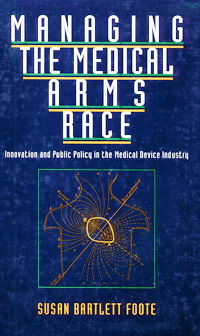 | Title: Managing the medical arms race: public policy and medical device innovation Author: Foote, Susan Bartlett Published: University of California Press, 1992 Subjects: Politics | Medicine | Public Policy | Economics and Business Publisher's Description: The allure of medical innovation is powerful - it holds out the promise of perfect health, the end of pain, the deferral of death. Our insatiable appetite for costly new technologies, fed by a profusion of innovations and the profits they generate, has led to what has been dubbed the medical arms race. During the last several decades government has been called upon to manage the escalation of this race.Foote has written the first comprehensive examination of the profound influence of government policies on medical innovation. She explains how these policies have proliferated to affect every stage of the innovative process in medical device technology - from the first research idea to the patient's bedside. Drawing on case studies of technologies as diverse as lasers, cardiac pacemakers, CT scanners, and IUDs, she traces the interaction between the industry and government institutions, including the National Institutes of Health, the FDA, and the Medicare and Medicaid programs.Public policies during the 1950s and 1960s, Foote discovers, tended to promote innovation, while the regulation and cost controls of the 1970s and 1980s began to inhibit it. For the 1990s and beyond she proposes incremental policy improvements that will rationalize and streamline government intervention. She cautions that we must recognize the limits of medical technology and public policy to cure all ills.Medical innovation is a crucial part of health care reform, a subject of increasing complexity and controversy. Written clearly and accessibly, Managing the Medical Arms Race is an invaluable source for medical, industry, and policy professionals, but it also has much to say to anybody concerned with how we as a society choose to take care of our health. [brief] Similar Items |
| 9. | 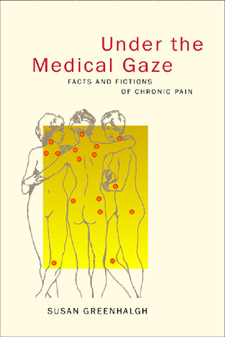 | Title: Under the medical gaze: facts and fictions of chronic pain Author: Greenhalgh, Susan Published: University of California Press, 2001 Subjects: Anthropology | Folklore and Mythology | Medical Anthropology | Physical Anthropology | Cultural Anthropology | Medicine | Gender Studies | Sociology | Social Problems | Social Problems Publisher's Description: This compelling account of the author's experience with a chronic pain disorder and subsequent interaction with the American health care system goes to the heart of the workings of power and culture in the biomedical domain. It is a medical whodunit full of mysterious misdiagnosis, subtle power plays, and shrewd detective work. Setting a new standard for the practice of autoethnography, Susan Greenhalgh presents a case study of her intense encounter with an enthusiastic young specialist who, through creative interpretation of the diagnostic criteria for a newly emerging chronic disease, became convinced she had a painful, essentially untreatable, lifelong muscle condition called fibromyalgia. Greenhalgh traces the ruinous effects of this diagnosis on her inner world, bodily health, and overall well-being. Under the Medical Gaze serves as a powerful illustration of medicine's power to create and inflict suffering, to define disease and the self, and to manage relationships and lives. Greenhalgh ultimately learns that she had been misdiagnosed and begins the long process of undoing the physical and emotional damage brought about by her nearly catastrophic treatment. In considering how things could go so awry, she embarks on a cogent and powerful analysis of the sociopolitical sources of pain through feminist, cultural, and political understandings of the nature of medical discourse and practice in the United States. She develops fresh arguments about the power of medicine to medicalize our selves and lives, the seductions of medical science, and the deep, psychologically rooted difficulties women patients face in interactions with male physicians. In the end, Under the Medical Gaze goes beyond the critique of biomedicine to probe the social roots of chronic pain and therapeutic alternatives that rely on neither the body-cure of conventional medicine nor the mind-cure of some alternative medicines, but rather a broader set of strategies that address the sociopolitical sources of pain. [brief] Similar Items |
| 10. | 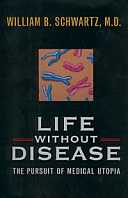 | Title: Life without disease: the pursuit of medical utopia Author: Schwartz, William B 1922- Published: University of California Press, 1998 Subjects: Science | Medicine | Economics and Business | History and Philosophy of Science | Public Policy Publisher's Description: The chaotic state of today's health care is the result of an explosion of effective medical technologies. Rising costs will continue to trouble U.S. health care in the coming decades, but new molecular strategies may eventually contain costs. As life expectancy is dramatically extended by molecular medicine, a growing population of the aged will bring new problems. In the next fifty years genetic intervention will shift the focus of medicine in the United States from repairing the ravages of disease to preventing the onset of disease. Understanding the role of genes in human health, says Dr. William B. Schwartz, is the driving force that will change the direction of medical care, and the age-old dream of life without disease may come close to realization by the middle of the next century. Medical care in 2050 will be vastly more effective, Schwartz maintains, and it may also be less expensive than the resource-intensive procedures such as coronary bypass surgery that medicine relies on today.Schwartz's alluring prospect of a medical utopia raises urgent questions, however. What are the scientific and public policy obstacles that must be overcome if such a goal is to become a reality? Restrictions on access imposed by managed care plans, the corporatization of charitable health care institutions, the increasing numbers of citizens without health insurance, the problems with malpractice insurance, and the threatened Medicare bankruptcy - all are the legacy of medicine's great progress in mastering the human body and society's inability to assimilate that mastery into existing economic, ethical, and legal structures. And if the average American life span is 130 years, a genuine possibility by 2050, what social and economic problems will result?Schwartz examines the forces that have brought us to the current health care state and shows how those same forces will exert themselves in the decades ahead. Focusing on the inextricable link between scientific progress and health policy, he encourages a careful examination of these two forces in order to determine the kind of medical utopia that awaits us. The decisions we make will affect not only our own care, but also the system of care we bequeath to our children. [brief] Similar Items |
| 11. |  | Title: Writing at the margin: discourse between anthropology and medicine Author: Kleinman, Arthur Published: University of California Press, 1997 Subjects: Anthropology | Medical Anthropology | Sociology | Medicine | Asian Studies | Social Problems Publisher's Description: One of the most influential and creative scholars in medical anthropology takes stock of his recent intellectual odysseys in this collection of essays. Arthur Kleinman, an anthropologist and psychiatrist who has studied in Taiwan, China, and North America since 1968, draws upon his bicultural, multidisciplinary background to propose alternative strategies for thinking about how, in the postmodern world, the social and medical relate. Writing at the Margin explores the border between medical and social problems, the boundary between health and social change. Kleinman studies the body as the mediator between individual and collective experience, finding that many health problems - for example the trauma of violence or depression in the course of chronic pain - are less individual medical problems than interpersonal experiences of social suffering. He argues for an ethnographic approach to moral practice in medicine, one that embraces the infrapolitical context of illness, the responses to it, the social institutions relating to it, and the way it is configured in medical ethics.Previously published in various journals, these essays have been revised, updated, and brought together with an introduction, an essay on violence and the politics of post-traumatic stress disorder, and a new chapter that examines the contemporary ethnographic literature of medical anthropology. [brief] Similar Items |
| 12. |  | Title: Hellenistic philosophy of mind Author: Annas, Julia Published: University of California Press, 1994 Subjects: Classics | Social and Political Thought | Intellectual History | Classical Philosophy | Philosophy | Rhetoric Publisher's Description: Hellenistic Philosophy of Mind is an elegant survey of Stoic and Epicurean ideas about the soul - an introduction to two ancient schools whose belief in the soul's physicality offer compelling parallels to modern approaches in the philosophy of mind. Annas incorporates recent thinking on Hellenistic philosophy of mind so lucidly and authoritatively that specialists and nonspecialists alike will find her book rewarding.In part, the Hellenistic epoch was a "scientific" period that broke with tradition in ways that have an affinity with the modern shift from the seventeenth and eighteenth centuries to the present day. Hellenistic philosophy of the soul, Annas argues, is in fact a philosophy of mind, especially in the treatment of such topics as perception, thought, and action. [brief] Similar Items |
| 13. | 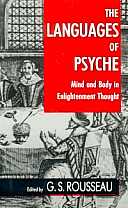 | Title: The Languages of psyche: mind and body in Enlightenment thought: Clark Library lectures, 1985-1986 Author: Rousseau, G. S. (George Sebastian) Published: University of California Press, 1991 Subjects: History | Medicine | History and Philosophy of Science | European History | European Literature Publisher's Description: The Languages of Psyche traces the dualism of mind and body during the "long eighteenth century," from the Restoration in England to the aftermath of the French Revolution. Ten outstanding scholars investigate the complex mind-body relationship in a variety of Enlightenment contexts - science, medicine, philosophy, literature, and everyday society. No other recent book provides such an in-depth, suggestive resource for philosophers, literary critics, intellectual and social historians, and all who are interested in Enlightenment studies. [brief] Similar Items |
| 14. | 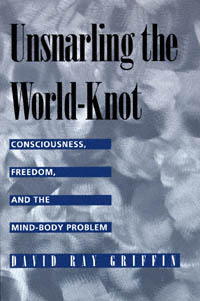 | Title: Unsnarling the world-knot: consciousness, freedom, and the mind-body problem Author: Griffin, David Ray 1939- Published: University of California Press, 1998 Subjects: Philosophy | Intellectual History Publisher's Description: The mind-body problem, which Schopenhauer called the "world-knot," has been a central problem for philosophy since the time of Descartes. Among realists - those who accept the reality of the physical world - the two dominant approaches have been dualism and materialism, but there is a growing consensus that, if we are ever to understand how mind and body are related, a radically new approach is required.David Ray Griffin develops a third form of realism, one that resolves the basic problem (common to dualism and materialism) of the continued acceptance of the Cartesian view of matter. In dialogue with various philosophers, including Dennett, Kim, McGinn, Nagel, Seager, Searle, and Strawson, Griffin shows that materialist physicalism is even more problematic than dualism. He proposes instead a pan-experientialist physicalism grounded in the process philosophy of Alfred North Whitehead. Answering those who have rejected "pan-psychism" as obviously absurd, Griffin argues compellingly that pan-experientialism, by taking experience and spontaneity as fully natural, can finally provide a naturalistic account of the emergence of consciousness - an account that also does justice to the freedom that we all presuppose in practice. [brief] Similar Items |
| 15. | 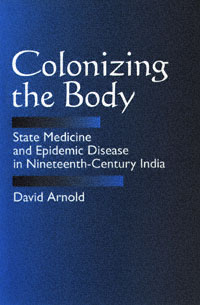 | Title: Colonizing the body: state medicine and epidemic disease in nineteenth-century India Author: Arnold, David 1946- Published: University of California Press, 1993 Subjects: Asian Studies | South Asia | Asian History | Medicine | History Publisher's Description: In this innovative analysis of medicine and disease in colonial India, David Arnold explores the vital role of the state in medical and public health activities, arguing that Western medicine became a critical battleground between the colonized and the colonizers.Focusing on three major epidemic diseases - smallpox, cholera, and plague - Arnold analyzes the impact of medical interventionism. He demonstrates that Western medicine as practiced in India was not simply transferred from West to East, but was also fashioned in response to local needs and Indian conditions.By emphasizing this colonial dimension of medicine, Arnold highlights the centrality of the body to political authority in British India and shows how medicine both influenced and articulated the intrinsic contradictions of colonial rule. [brief] Similar Items |
| 16. | 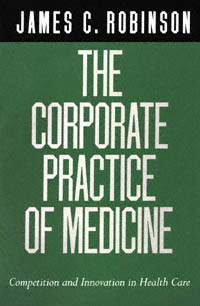 | Title: The corporate practice of medicine: competition and innovation in health care Author: Robinson, James C 1953- Published: University of California Press, 1999 Subjects: Politics | Public Policy | Medicine | Economics and Business Publisher's Description: One of the country's leading health economists presents a provocative analysis of the transformation of American medicine from a system of professional dominance to an industry under corporate control. James Robinson examines the economic and political forces that have eroded the traditional medical system of solo practice and fee-for-service insurance, hindered governmental regulation, and invited the market competition and organizational innovations that now are under way. The trend toward health care corporatization is irreversible, he says, and it parallels analogous trends toward privatization in the world economy.The physician is the key figure in health care, and how physicians are organized is central to the health care system, says Robinson. He focuses on four forms of physician organization to illustrate how external pressures have led to health care innovations: multispecialty medical groups, Independent Practice Associations (IPAs), physician practice management firms, and physician-hospital organizations. These physician organizations have evolved in the past two decades by adopting from the larger corporate sector similar forms of ownership, governance, finance, compensation, and marketing.In applying economic principles to the maelstrom of health care, Robinson highlights the similarities between competition and consolidation in medicine and in other sectors of the economy. He points to hidden costs in fee-for-service medicine - overtreatment, rampant inflation, uncritical professional dominance regarding treatment decisions - factors often overlooked when newer organizational models are criticized.Not everyone will share Robinson's appreciation for market competition and corporate organization in American health care, but he challenges those who would return to the inefficient and inequitable era of medicine from which we've just emerged. Forcefully written and thoroughly documented, The Corporate Practice of Medicine presents a thoughtful - and optimistic - view of a future health care system, one in which physician entrepreneurship is a dynamic component. [brief] Similar Items |
| 17. |  | Title: A flourishing Yin: gender in China's medical history, 960-1665 Author: Furth, Charlotte Published: University of California Press, 1999 Subjects: History | Asian History | Asian Studies | Women's Studies | China | Medicine Publisher's Description: This book brings the study of gender to Chinese medicine and in so doing contextualizes Chinese medicine in history. It examines the rich but neglected tradition of fuke , or medicine for women, over the seven hundred years between the Song and the end of the Ming dynasty. Using medical classics, popular handbooks, case histories, and belles lettres , it explores evolving understandings of fertility and menstruation, gestation and childbirth, sexuality, and gynecological disorders.Furth locates medical practice in the home, where knowledge was not the monopoly of the learned physician and male doctors had to negotiate the class and gender boundaries of everyday life. Women as healers and as patients both participated in the dominant medical culture and sheltered a female sphere of expertise centered on, but not limited to, gestation and birth. Ultimately, her analysis of the relationship of language, text, and practice reaches beyond her immediate subject to address theoretical problems that arise when we look at the epistemological foundations of our knowledge of the body and its history. [brief] Similar Items |
| 18. | 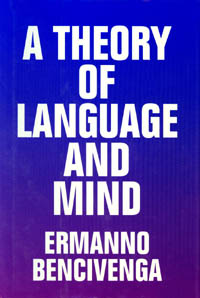 | Title: A theory of language and mind Author: Bencivenga, Ermanno 1950- Published: University of California Press, 1997 Subjects: Philosophy Publisher's Description: In his most recent book, Ermanno Bencivenga offers a stylistically and conceptually exciting investigation of the nature of language, mind, and personhood and the many ways the three connect. Bencivenga, one of the most iconoclastic voices to emerge in contemporary American philosophy, contests the basic assumptions of analytic (and also, to an extent, postmodern) approaches to these topics. His exploration leads through fascinating discussions of education, courage, pain, time and history, selfhood, subjectivity and objectivity, reality, facts, the empirical, power and transgression, silence, privacy and publicity, and play - all themes that are shown to be integral to our thinking about language. Relentessly bending the rules, Bencivenga frustrates our expectations of a "proper" theory of language. He invokes the transgressions of Nietzsche and Wittgenstein even as he appropriates the aphoristic style of Wittgenstein's Tractatus . Written in a philosophically playful and experimental mode, A Theory of Language and Mind draws the reader into a sense of continual surprise, therapeutic discomfort, and discovery. [brief] Similar Items |
| 19. | 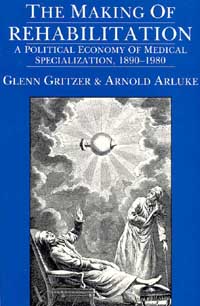 | Title: The making of rehabilitation: a political economy of medical specialization, 1890-1980 Author: Gritzer, Glenn Published: University of California Press, 1989 Subjects: Anthropology | Cultural Anthropology Publisher's Description: Focusing on the history of one medical field - rehabilitation medicine - this book provides the first systematic analysis of the underlying forces that shape medical specialization, challenging traditional explanations of occupational specialization. Similar Items |
| 20. |  | Title: Symbols, computation, and intentionality: a critique of the computational theory of mind Author: Horst, Steven W 1960- Published: University of California Press, 1996 Subjects: Philosophy | Social and Political Thought | Psychology Publisher's Description: The computational theory of mind - the belief that the mind can be likened to a computer and that cognitive states possess the generative and compositional properties of natural languages - has proven enormously influential in recent philosophical studies of cognition. In this carefully argued critique, Steven Horst pronounces the theory deficient. He refutes its claims and assumptions, particularly the assertion that symbolic representations need not have conventional meaning. Horst goes on to sketch a new methodology for looking at the philosophy of psychology, one that provides a more fruitful way of comparing computational psychology with rival views emerging from connectionism and neuroscience. Original and comprehensive, his book is certain to provoke controversy and stimulate debate. [brief] Similar Items |